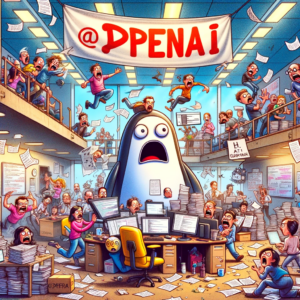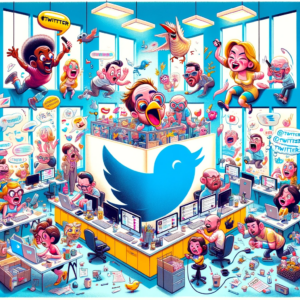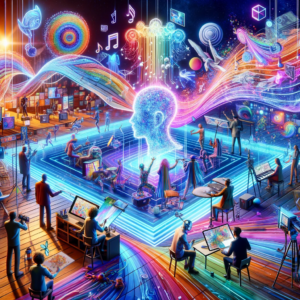2023 has been a massive year for tech news crossing into mainstream news. Here are 5 tech news stories from 2023 that we’ve been following that could impact our business and yours.
In the interest of staying relevant, all images were generated by…generative AI!

The Wild Saga of OpenAI's Leadership Shakeup
Where to even begin with the recent drama at OpenAI? It might seem like an episode of Silicon Valley, but sadly it’s real!
After launching ChatGPT in 2022, OpenAI made waves again in March when it released ChatGPT-4. This new version of GPT sparked a widespread conversation about exactly how much AI could change our lives by taking our jobs, redefining plagiarism, or generally making everything much more efficient. So when chaos broke out at OpenAI, even non-technical “normies” were astonished.
In case you missed it, here’s what happened:
The OpenAI board abruptly fired their CEO, Sam Altman, on November 17th without any warning. The reason cited was that Altman was “not being candid in his communications” – a pretty thin reason, which is likely why the backlash was as strong as it was.
The majority of the company threatened to quit, Microsoft hired Sam Altman, OpenAI then hired someone else to be CEO, and then Altman was RE-hired on November 30th.
All the board members (except Adam D’Angelo, CEO of Quora) were replaced, and now there’s a three-person board consisting of D’Angelo, Salesforce CEO Bret Taylor, and economist Larry Summers. It’s enough to make you dizzy.
But aside from providing a week and a half of juicy drama, this story has brought to light some interesting implications.
- What’s next for the relationship between Microsoft and OpenAI
- What’s the state of OpenAI’s mission to ethically build “safe and beneficial AI”? And will things be impacted by having a board of only 3 white men?
- ChatGPT was down last month – what are the risks of relying on a walled garden like this? How fast can we get viable alternatives with acceptable trade offs?
Coverage:
A timeline of Sam Altman’s firing from OpenAI – and the fallout (TechCrunch)
Why Sam Altman’s removal – and reinstatement – as CEO actually matters (Forbes)
A Timeline of Everything That Happened After Sam Altman’s Firing (Hubspot)
Reflecting on one year of ChatGPT: How has the world been changed? (The Drum)

X Marks the Spot for Drama
Speaking of tech drama – X (a.k.a. The Artist Formerly Known As Twitter) has had its own series of dramatic events since Elon Musk took over the company last year.
From firing 80% of the workforce, to appointing a CEO whose entire job seems to be damage control to installing a giant flashing X sign that was removed days after it was mounted due to being a poorly-built nuisance, Musk has been making waves all year. (Oh, one more little thing – he completely changed the name and brand of an extremely recognizable company, making it almost unrecognizable.)
We even wrote a blog post about how to handle the changes in the X API.
But nothing is more shocking than the complete alienation and exodus of advertising dollars from the platform. Not many business owners will tell advertisers, the primary source of revenue for their business, to go f**k themselves, but that’s exactly what Elon Musk did recently at the New York Times DealBook Summit.
Even prior to the most recent advertiser boycott, advertising was down 60% by September 2023. X (Twitter) was always an afterthought in an advertising budget, but now the platform has become so toxic that advertisers and users are leaving in droves. Whether this is intentional, or Musk’s attempt to turn the platform into something else entirely, we’ll never know.
Apart from the wider implications, from a marketing perspective, the meltdown at X (Twitter) leaves us with a number of questions:
- Will major advertisers return to the platform? If not, where will that media spend be moved?
- Will X address the brand safety issues?
- Will X be around this time next year and if so, in what form?

Generative AI Sparks Major Changes and Challenges in Creative Industries
Hollywood came to a screeching halt earlier this year as both the WGA and SAG-AFTRA went on strike. While lowballing artists is common practice in every industry (because passionate workers are easy to take advantage of), and there were many factors involved in the strike, one of the most serious and controversial points of contention was the use of AI in the creative industries.
Whether it’s the right to use an actor’s image for free (forever), reducing the number of writers in TV rooms by requiring the use of AI, or feeding copyrighted novels to LLMs illegally, this year has led to big conversations about the value of human creativity and the ethics of co-opting the work of artists to reduce a corporation’s bottom line.
As an aside, a wider implication of the strikes that didn’t have to do directly with AI is the incredible cost of acquisition and whether we’ve reached peak streaming. With the cost of acquiring customers at a high, streaming platforms are having to look at new methods of customer acquisition, such as bundling.
Coverage
Generative AI Has an Intellectual Property Problem (Harvard Business Review)
5 ways generative AI will impact the creative industry (Ready State)

AI's Lightning-Fast Leap into the Limelight
It’s hard to believe, but ChatGPT was only released a year ago. With over one hundred million people using the platform on a weekly basis, it’s the fastest growing consumer app in history. Those numbers are impressive purely by themselves, but the mainstream rate of adoption of AI is truly impressive.
It’s not just ChatGPT – the rate of new AI products has skyrocketed, and the technology has gone from something that was running quietly in the background of many platforms to mainstream news. (Refer to the above Sam Altman drama.)
Your granny might not be using AI on a regular basis yet, but it’s only a matter of time.
- Which LLMs can perform in private cloud type environments and generate “accurate” enough results?
- What’s are the best ways to QA/validate the outputs of model generated content
- How small a draw on resources can these use? We have team members working on LLMs using small processors (check usage with Chris)
- How can we automate prompt engineering off business data in a sustainable way?

That's the Way the Cookie Crumbles: The End of an Era for Third-Party Cookies
Reports of the death of the third-party cookie have been greatly exaggerated…or at least they were, until recently. Even though Google was determined to find an alternative to third-party cookies by 2022, they’ve mostly just been tinkering with alternatives. But Google has now announced that it will be phasing out cookies from Chrome “by the end of 2024”.
Their new privacy-safe cookie alternative is called “Protected Audience”, formerly called FLEDGE. Protected Audience works by making ad auction decisions directly in the browser, rather than in an ad server. The intention is to keep user data local instead of directing it through ad systems, so that there’s less specific information available to build user profiles.
There’s still some debate about whether Protected Audience is the best way to protect user information. And Google is not setting an industry standard around this – Apple, for example, is developing its own way to phase out third-party cookies. But no matter how it happens, we’re finally going to see a massive change in how online advertising works after years in limbo.
The biggest implication for the demise of third party cookies is clear: Does your business have a strategy in place to address these changes?
Hard to believe that all happened this year.
Whether you need support to implement a generative AI strategy, planning for a post-cookie world or you simply want to chat about the X API - we’re here to help.

